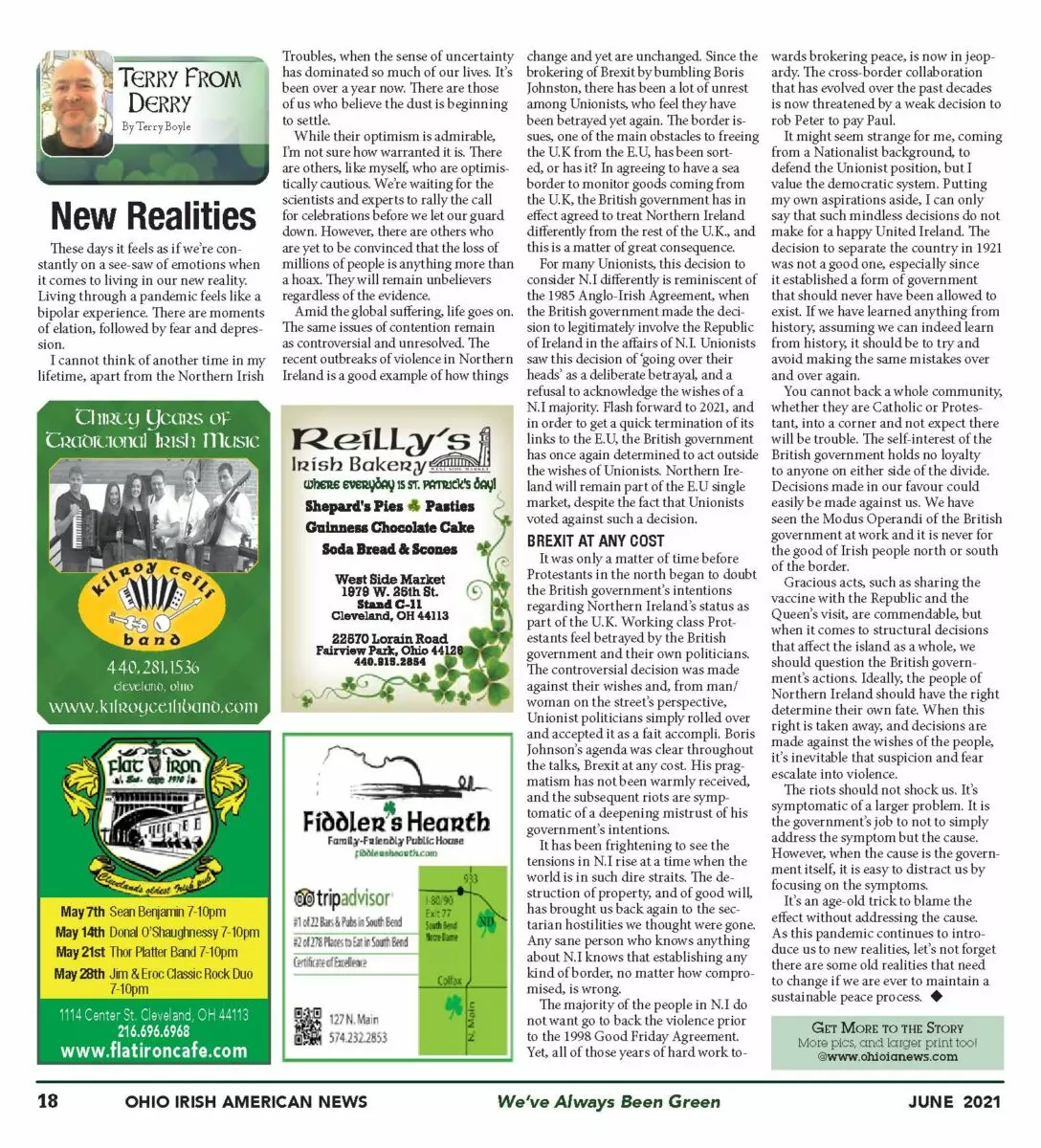New Realities: Terry from Derry
- John O'Brien
- June 4, 2021
- Edited 5 months ago
Table of Contents

Terry from Derry: New Realities
by Terry Boyle
These days it feels as if we’re constantly on a see-saw of emotions when it comes to living in our new reality.
Living through a pandemic feels like a bipolar experience. There are moments of elation, followed by fear and depression.
I cannot think of another time in my lifetime, apart from the Northern Irish Troubles, when the sense of uncertainty has dominated so much of our lives. It’s been over a year now. There are those of us who believe the dust is beginning to settle.
While their optimism is admirable, I’m not sure how warranted it is. There are others, like myself, who are optimistically cautious. We’re waiting for the scientists and experts to rally the call for celebrations before we let our guard down. However, there are others who are yet to be convinced that the loss of millions of people is anything more than a hoax. They will remain unbelievers regardless of the evidence.
Amid the global suffering, life goes on. The same issues of contention remain as controversial and unresolved. The recent outbreaks of violence in Northern Ireland is a good example of how things change and yet are unchanged. Since the brokering of Brexit by bumbling Boris Johnston, there has been a lot of unrest among Unionists, who feel they have been betrayed yet again. The border issues, one of the main obstacles to freeing the U.K from the E.U, has been sorted, or has it? In agreeing to have a sea border to monitor goods coming from the U.K, the British government has in effect agreed to treat Northern Ireland differently from the rest of the U.K., and this is a matter of great consequence.
For many Unionists, this decision to consider N.I differently is reminiscent of the 1985 Anglo-Irish Agreement, when the British government made the decision to legitimately involve the Republic of Ireland in the affairs of N.I. Unionists saw this decision of ‘going over their heads’ as a deliberate betrayal, and a refusal to acknowledge the wishes of a N.I majority. Flash forward to 2021, and in order to get a quick termination of its links to the E.U, the British government has once again determined to act outside the wishes of Unionists. Northern Ireland will remain part of the E.U single market, despite the fact that Unionists voted against such a decision.
Brexit at any Cost
It was only a matter of time before Protestants in the north began to doubt the British government’s intentions regarding Northern Ireland’s status as part of the U.K. Working class Protestants feel betrayed by the British government and their own politicians. The controversial decision was made against their wishes and, from man/woman on the street’s perspective, Unionist politicians simply rolled over and accepted it as a fait accompli. Boris Johnson’s agenda was clear throughout the talks, Brexit at any cost. His pragmatism has not been warmly received, and the subsequent riots are symptomatic of a deepening mistrust of his government’s intentions.
It has been frightening to see the tensions in N.I rise at a time when the world is in such dire straits. The destruction of property, and of good will, has brought us back again to the sectarian hostilities we thought were gone. Any sane person who knows anything about N.I knows that establishing any kind of border, no matter how compromised, is wrong.
The majority of the people in N.I do not want go to back the violence prior to the 1998 Good Friday Agreement. Yet, all of those years of hard work towards brokering peace, is now in jeopardy. The cross-border collaboration that has evolved over the past decades is now threatened by a weak decision to rob Peter to pay Paul.
It might seem strange for me, coming from a Nationalist background, to defend the Unionist position, but I value the democratic system. Putting my own aspirations aside, I can only say that such mindless decisions do not make for a happy United Ireland. The decision to separate the country in 1921 was not a good one, especially since it established a form of government that should never have been allowed to exist. If we have learned anything from history, assuming we can indeed learn from history, it should be to try and avoid making the same mistakes over and over again.
You cannot back a whole community, whether they are Catholic or Protestant, into a corner and not expect there will be trouble. The self-interest of the British government holds no loyalty to anyone on either side of the divide. Decisions made in our favour could easily be made against us. We have seen the Modus Operandi of the British government at work and it is never for the good of Irish people north or south of the border.
Gracious acts, such as sharing the vaccine with the Republic and the Queen’s visit, are commendable, but when it comes to structural decisions that affect the island as a whole, we should question the British government’s actions. Ideally, the people of Northern Ireland should have the right determine their own fate. When this right is taken away, and decisions are made against the wishes of the people, it’s inevitable that suspicion and fear escalate into violence.
The riots should not shock us. It’s symptomatic of a larger problem. It is the government’s job to not to simply address the symptom but the cause. However, when the cause is the government itself, it is easy to distract us by focusing on the symptoms.
It’s an age-old trick to blame the effect without addressing the cause. As this pandemic continues to introduce us to new realities, let’s not forget there are some old realities that need to change if we are ever to maintain a sustainable peace process.
*Terry is a retired professor at Loyola University, Chicago. He writes and reviews plays, while also teaching modern Irish and English drama. Moving from Derry, N. Ireland to Chicago in 2004, he continues to enjoy is work with the Irish American community throughout America. He can be reached: [email protected]





